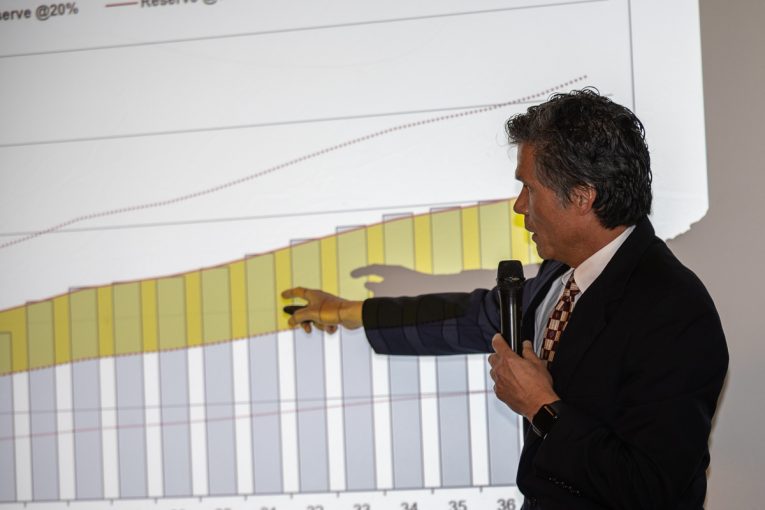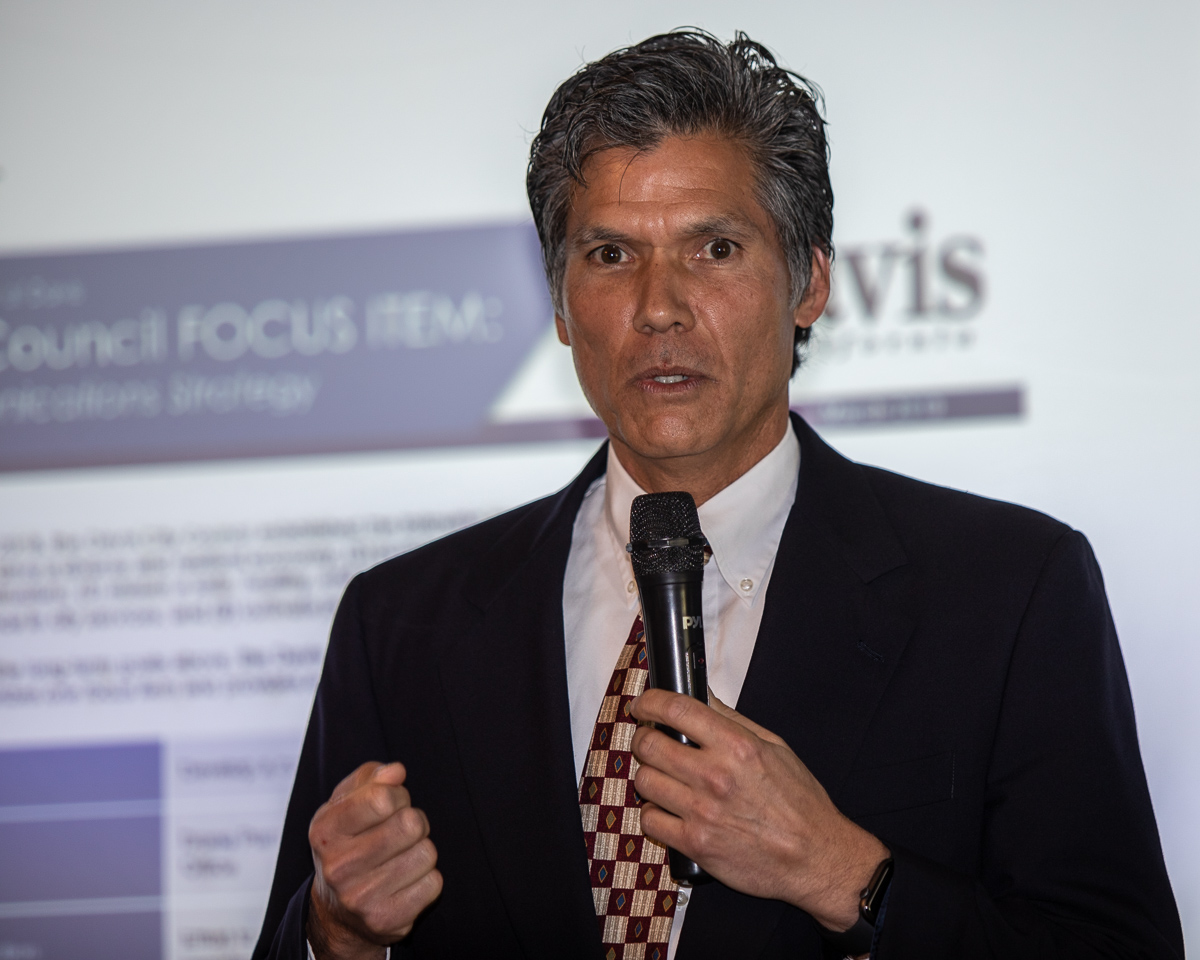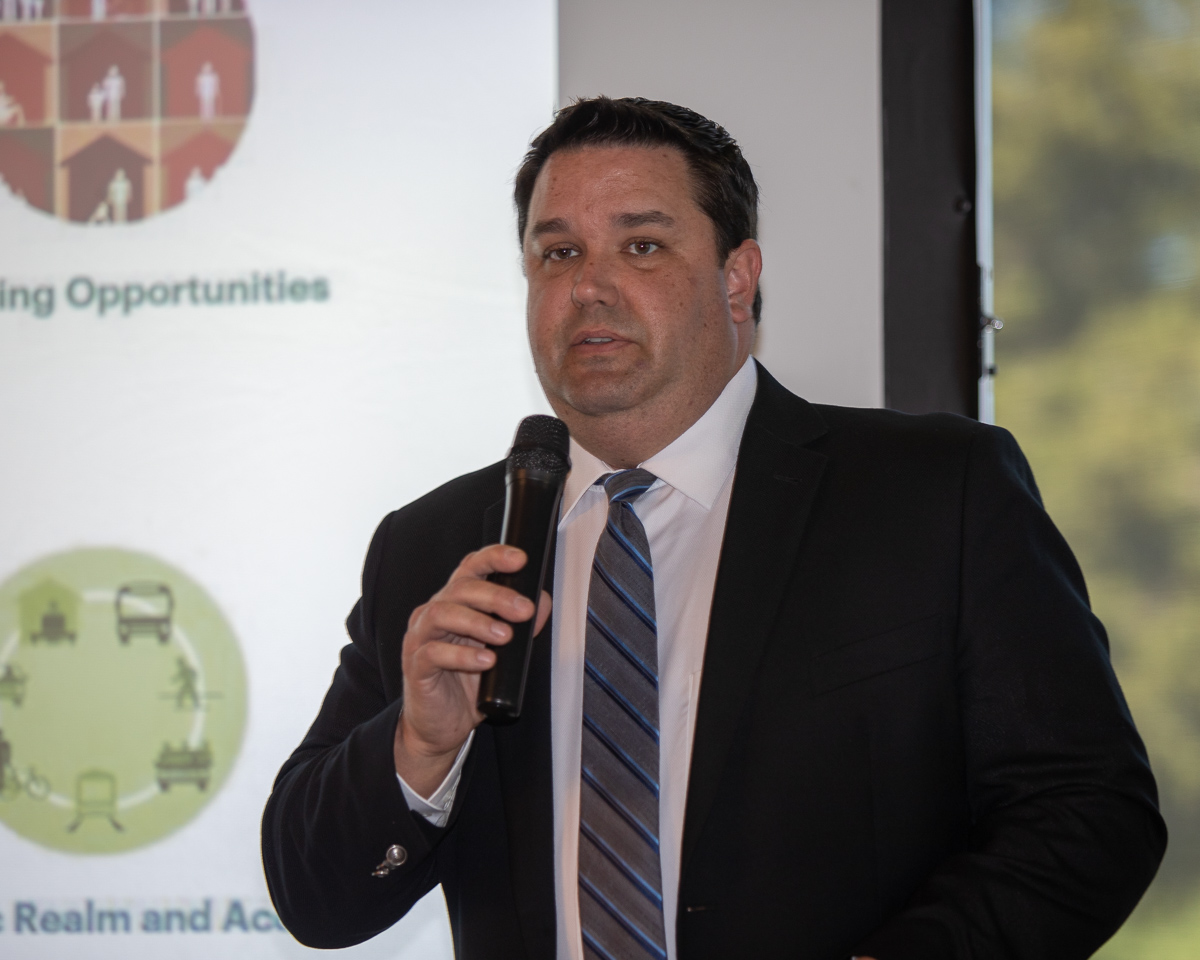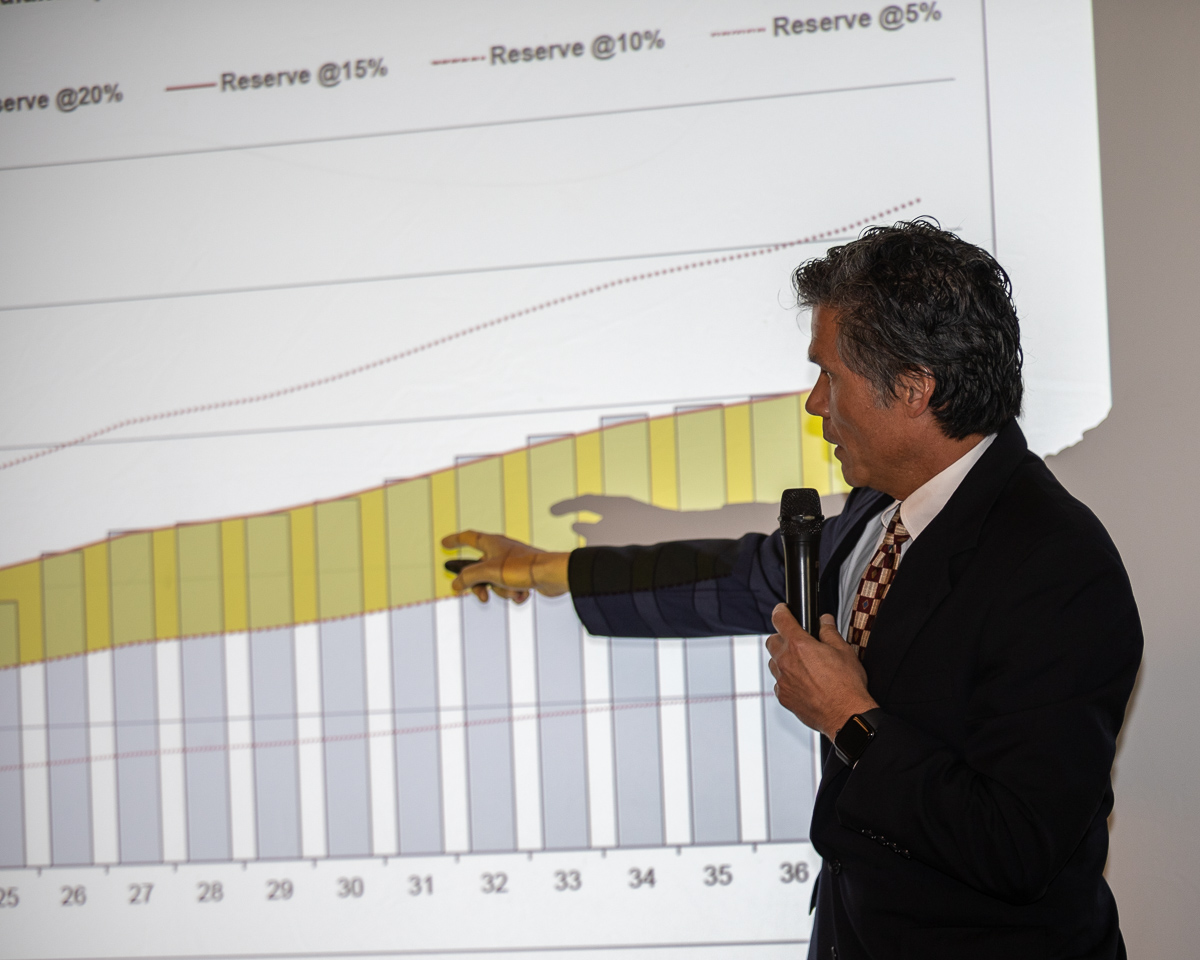

Mayor Brett Lee and City Manager Mike Webb spoke at the annual Chamber State of the City luncheon. Mike Webb spoke to the issue of the Downtown Core Area Specific Plan (CASP) update.
He called the plan “multifaceted” and told the group, “We are really focused on creating a downtown plan that’s forward thinking, that’s looking ahead to 2040 and beyond.”
Right now, he said, for anyone who wants to develop or redevelop their property, “we have what we could (say) – and I’m probably being polite about it – a cumbersome process to navigate.”
Currently there are six different policy documents that govern how people can deal with their property. “One of the desired parts of the downtown effort is to consolidate those regulations (and) documents into one easy to use, easy to understand and navigate  format.”
format.”
He said that “the approach we’re taking is a form-based code.”
Mike Webb also explained that housing opportunities are a big focus of the downtown plan.
Mr. Webb said, “There’s a real interest in introducing more and different types of housing variety into our downtown to really invigorate the downtown and make it more of a 24 hour / 7 (day) presence.
“By having folks living above businesses,” he explained, “it livens the atmosphere and provides a built in customer base as well.”
The goal is for a public review period starting this spring, which would last for 75 days. There would be a public workshop and presentation, a DPAC (Downtown Plan Advisory Committee) meeting and some commission workshops.

They would then prepare the EIR, it would go to a planning commission hearing for recommendation and the goal is to get it to a council hearing about a year from now in the spring of 2020.
Mayor Brett Lee talked about the development of city council focus items.
“What we wanted to do is have some publicized goals that we’re working (on) and that we hold ourselves and staff accountable for in terms of delivering them,” he explained.
These goals include: “Communications Strategic Plan, Lights in Toad Hollow Dog Park, Economic Development Space Inventory, Homelessness Strategic Plan, Restripe Safe Routes to Schools, Sports Park Economic Analysis, and Downtown Restrooms.”
They developed their focus list a year or two ago to pick “distinct items that the city manager and city staff… to help us understand where we’re strong and where we’re not strong.” This allows staff and council to focus on a relatively small number of focused items rather than a long laundry list that is hard to follow up on.
“These items have time parameters around them,” he explained. “These are things that each month we get an update on.”
Mike Webb later talked about the fiscal health of the city, which he said “is in fairly good order” from an operational perspective. Where there are challenges is “ongoing and increasing costs that are associated with the retirement system and PERS, OPEB – these are things that tend not get cheaper over time.”
He said, “Managing those costs and predicting where they are heading over time becomes crucially important.”
Mike Webb also provided an update to the city’s economic development plan. Currently the Marriott is being built out on Second and Mace while another hotel, Hyatt House by Davis Diamonds, is currently in the building permit process.
“We have Nugget Market headquarters coming to Davis,” he said. Other projects he talked about include: University Research Parks, MARS, ADM, Engage3, and Arcadia Biosciences.
He explained, “We’re seeing emerging sectors – AgTech, Food Tech, BioTech, energy in particular are really emerging sectors.”
Mr. Webb said that they will be announcing that the MARS Corporation is doing tenant improvements at 5th and G. “They’re bringing into place a number of R&D Research and Development jobs for cocoa research. They have a 35-year relationship with UC Davis. So we’re very proud to say that Davis will be their new Cocoa R&D hub.”
 Mayor Lee answered a few audience questions.
Mayor Lee answered a few audience questions.
“The relationship with the university,” he said, responding to the first question, “it is back on track.
“For a number of years, we had an odd situation where the city and the university did not really work together,” he explained. “We sort of pretended to work together. We would sort of go through the motions – but it was as a courtesy.” He said, “There wasn’t a real sense that there was a working partnership.
“That really has changed,” he said. “That moment in time when it changed was where the city, university, and the county came together to discuss housing and enrollment.”
He said the outcome of that was the Memorandum of Understanding that was agreed to last fall on housing and city infrastructure needs, among other things.
Naturally he was asked about paid parking.
“Council is supportive of downtown,” he said. “We have good intentions.
“The city has limited resources,” he said. “We don’t have $20 million for a (new) parking garage.
“With paid parking there is this understandable dislike for having to pay for parking,” he explained. “One of the ideas is to have paid parking because we don’t have the ability financially to build a new garage.”
The mayor also noted that a “good chunk of the people parking in the downtown are employees or actual students.” He said, “The question is how do we incentivize folks to not use parking spaces which would be better used by people who are shopping in our downtown?
“It’s kind of a tricky situation,” he said. “I would say that the council is open minded, we want to do what will support downtown.”
He added that paid parking is still an open question for the council.
“When you look at the big picture, it is no surprise that we would look at the idea of paid parking,” he said.
Finally he spoke about a new program for the homeless – a respite center.
The mayor explained that a big problem is that, because the homeless cannot simply go and hang out in neighborhoods or residential areas all day, they go to the downtown where they can blend in a bit better.
However, they have a new idea about where the homeless can go so that they are not in the downtown all day.
He said, “(A) respite center where people can go, where it’s planned that they go there.
“There isn’t sort of one solution,” he said. “This is a piece.”
The mayor is hoping to have the respite center online by the fall.
—David M. Greenwald reporting


Advice for the FBC and Finance Department that a Davis citizen gave me yesterday after the State of the City presentation by the Mayor and City Manager — with attribution to Donald Rumsfeld
.
I forwarded that message on to the members of the Finance and Budget Commission and Finance Director Nitish Sharma, and got a speedy response from Nitish asking me to put the comment into context.
In my reply to him I shared my belief that the person’s point was that since 2000, for approximately a decade (more or less), Davis only paid attention to what was overtly reported in the Budget. The idea of a spending shortfall beyond that Budget was rarely part of the public dialogue.
In the most recent three years both the City and the community started to pay attention to the amount of money that we really should be spending to maintain our infrastructure, so it does not decay around us.
However, as we have recently seen, we are still susceptible to “surprises” like the unexpected/unplanned for/unaccounted for structural deterioration that caused the closing of the Civic Center gymnasium. Another example of better planning/forecasting is the good work that Nitish and his staff has recently been doing to make sure the City isn’t setting itself up for problems by overestimating future revenues.
Those “surprises” fall into the category of the things we don’t know we don’t know. The good news is that we are reducing the number of those … moving them in present time into the category of things we know we don’t know, and in time (hopefully) into the category of the things we know that we know.
So, I agree with the commenter that the Mayor’s and City Manager’s message to the Chamber yesterday channelled Donald Rumsfeld’s quote.
When do we get to have a downtown chocolate festival? I believe that would be a huge regional draw.
First I’ve heard of the homeless respite – seems like a good idea.